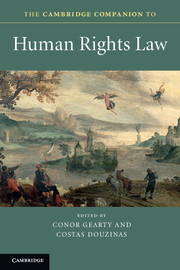Introduction
Published online by Cambridge University Press: 05 December 2012
Summary
In the preface we noticed one meaning of compendium, suggestive of a shortening or an abridgement. We start our substantive work here by recalling its Latin configuration, where a compendium was something ‘weighed or kept together. . . a gain or profit through saving’. A compendium of human rights law would be the collected gain, the saved wisdom, the amassed weight of ‘human’, ‘rights’ and ‘law’. Three contested concepts, long histories and complex practices are at stake. Their combination is weighty, profitable, its capital amassed and saved through the ages. Many tomes have been written and will be written about each of the three words. The term ‘human’ directs us away from what is other than humanity, the divine and the animal. Sacred and secular theologies as well as science are involved in defining the ‘human’ and determining its entitlements. The term ‘rights’ refers to ethics, morality and the law, to legal entitlements as well as to moral responsibilities. And the ‘law’ as institution and practice permeates every aspect of life and language. Every form of knowledge is affected by the law; every social relationship involves moral expectations and legal obligations. If the terms ‘human’ and ‘rights’ that precede it are to be taken seriously, every legal norm should aspire to promote the dignity of humanity.
Embracing the human
How does this Companion approach its responsibility to shorten and at the same time to produce ‘gain or profit’ through our saving of knowledge? In so vast a field our chapters must both cover their own ground and stand for something beyond their immediate remit – only in this way can the particular simultaneously evoke the general. Take first this idea of the human. In his ‘anatomy of rights jurisprudence’, Costas Douzinas in Chapter 3 considers the limitations in ‘conceptions of personhood’ that flow out of the work of those philosophers (principally here Alan Gewirth and James Griffin) who seek to impose a rational approach to human rights, above the messiness of history and the contingent meaning of words. Douzinas argues that the ‘“correct interpretation” of the capacity for rational action has been and still is a strategy used to exclude people’.
- Type
- Chapter
- Information
- The Cambridge Companion to Human Rights Law , pp. 1 - 14Publisher: Cambridge University PressPrint publication year: 2012
References
- 2
- Cited by



